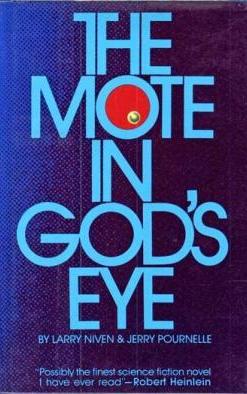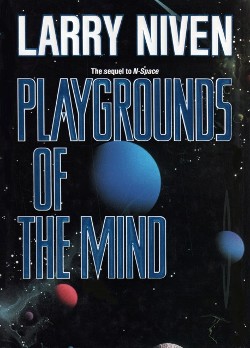
Arcology, a portmanteau of "architecture" and "ecology", is a field of creating architectural design principles for very densely populated and ecologically low-impact human habitats.

Jerry Eugene Pournelle was an American scientist in the area of operations research and human factors research, a science fiction writer, essayist, journalist, and one of the first bloggers. In the 1960s and early 1970s, he worked in the aerospace industry, but eventually focused on his writing career. In an obituary in Gizmodo, he is described as "a tireless ambassador for the future."

Laurence van Cott Niven is an American science fiction writer. His 1970 novel Ringworld won the Hugo, Locus, Ditmar, and Nebula awards. With Jerry Pournelle he wrote The Mote in God's Eye (1974) and Lucifer's Hammer (1977). The Science Fiction and Fantasy Writers of America gave him the 2015 Damon Knight Memorial Grand Master Award.

Science fiction fandom or SF fandom is a community or fandom of people interested in science fiction in contact with one another based upon that interest. SF fandom has a life of its own, but not much in the way of formal organization.
The Los Angeles Science Fantasy Society, Inc., or LASFS, is a science fiction and fantasy fan society that meets in the Los Angeles area. The current meeting place can be found on the LASFS website.
Steven Barnes is an American science fiction, fantasy, and mystery writer. He has written novels, short fiction, screen plays for television, scripts for comic books, animation, newspaper copy, and magazine articles.

The Legacy of Heorot is a science fiction novel by American writers Larry Niven, Jerry Pournelle, and Steven Barnes, first published in 1987. Reproduction and fertility expert Dr Jack Cohen acted as a consultant on the book, designing the novel life cycle of the alien antagonists, the grendels.

Military science fiction is a subgenre of science fiction that depicts the use of science fiction technology, including spaceships and weapons, for military purposes and usually principal characters who are members of a military organization, usually during a war; occurring sometimes in outer space or on a different planet or planets. It exists in a range of media, including literature, comics, film, television and video games.

The Mote in God's Eye is a science fiction novel by American writers Larry Niven and Jerry Pournelle, first published in 1974. The story is set in the distant future of Pournelle's CoDominium universe, and charts the first contact between humanity and an alien species. The title of the novel is a reference to the Biblical "The Mote and the Beam" parable and is the nickname of a star. The Mote in God's Eye was nominated for the Hugo, Nebula and Locus Awards in 1975.

The Magic Goes Away is a fantasy short story written by Larry Niven in 1976, and later expanded to a novella of the same name which was published in 1978. While these works were not the first in the "Magic Universe" or "Warlock" series, they marked a turning point after the 1973 oil crisis and Niven's subsequent transformation of the series into an allegory for a modern-day energy crisis. The setting was later used as a backdrop for the Golden Road series of novels The Burning City and Burning Tower, co-written with Jerry Pournelle, and the novel The Seascape Tattoo co-written with Steven Barnes.
Libertarian science fiction is a subgenre of science fiction that focuses on the politics and social order implied by right-libertarian philosophies with an emphasis on individualism and private ownership of the means of production—and in some cases, no state whatsoever.
A kinetic bombardment or a kinetic orbital strike is the hypothetical act of attacking a planetary surface with an inert kinetic projectile from orbit, where the destructive power comes from the kinetic energy of the projectile impacting at very high speeds. The concept originated during the Cold War.

The Burning City is a fantasy novel of social and political allegory by American writers Larry Niven and Jerry Pournelle. It is set in an analogue of Southern California in an imaginary past shortly after the sinking of Atlantis about 14,000 years ago in the twilight of a civilization then struggling and now vanished for lack of a crucial natural, and essentially non-renewable resource upon which almost all of its economy and technology depended. The vanishing resource is not oil but mana, something vital to the technology of magic and the metabolism of the supernatural. As mana becomes scarce gods sleep and finally die, unicorns get smaller and finally turn into hornless ponies, and magic becomes less and less effective and finally vanishes.

Dragon's Egg is a 1980 hard science fiction novel by American writer Robert L. Forward. In the story, Dragon's Egg is a neutron star with a surface gravity 67 billion times that of Earth, and inhabited by cheela, intelligent creatures the size of a sesame seed who live, think and develop a million times faster than humans. Most of the novel, from May to June 2050, chronicles the cheela civilization beginning with its discovery of agriculture to advanced technology and its first face-to-face contact with humans, who are observing the hyper-rapid evolution of the cheela civilization from orbit around Dragon's Egg.
Todos Santos, Todos os Santos or Todos los Santos, or may refer to:

Playgrounds of the Mind is a collection of short stories by American writer Larry Niven, published in 1991. It is the sequel to N-Space.
The Citizen's Advisory Council on National Space Policy was a group of prominent US citizens concerned with the space policy of the United States of America. It is no longer active.
Timescape Books was a science fiction line from Pocket Books operating from 1981 to 1985. Pocket Books is an imprint of Simon & Schuster.

The Water Knife is a 2015 science fiction novel by Paolo Bacigalupi. It is Bacigalupi's sixth novel, and is based on his short story, The Tamarisk Hunter, first published in the news magazine High Country News. It takes place in the near future, where drought brought on by climate change has devastated the Southwestern United States.
This is a complete bibliography by American science fiction author Larry Niven:












